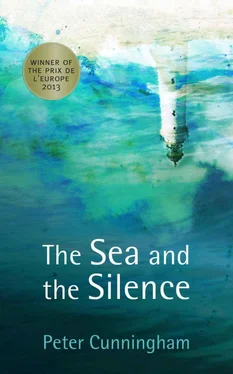1953 – 54
The sea ran all the way to the moon in endless corrugations. I slept, then sometime in the small hours, putting on a jacket and shoes, I went downstairs and out. Without a moon, the cliff would have been dangerous, but, on such nights, every hillock and blade of dew-shimmering grass was picked out with remorseless clarity. At the very apex of the rise, at the point where if one went any farther, sight of the lighthouse was lost, I put down. Over my left shoulder, if I turned, the light in the lantern bay glowed as if a secret were trapped in the deep.
Ronnie had moved out of the lighthouse and into the box-room in Langley’s. I refused to speak to him, so instead, he wrote to me, long, rambling letters full of remorse. Although he did not go so far as to blame the other woman for what had happened, knowing I would think even less of him for that, he did nonetheless insist that the evening had been impromptu.
I sat on the cliff and wondered about life’s apportionment. I would never really forgive Ronnie, I knew; but, then, life is a constant compromise with disappointment and imperfection.
The change from night to dawn came when the moon was still quite high and was attended by the whisper of a breeze from the east. Seabirds grumbled in the cliff below my feet and began to scatter outwards. Nothing dramatic occurred, no red ball of fire or the like; rather, more a gradual yellowing along the length of the eastern horizon and an ebbing of the black making way to blue, the sudden surge of the tide’s voice at dawn and the screech of oyster catchers.
Ronnie’s innate pomposity could not be concealed, even by his contrition: were I to give him another chance, I would discover how committed he was to our marriage and our love, he wrote. His letters travelled all the way from Sibrille into Monument and out again to the lighthouse.
I watched as black divers took shape and worked the surface of the sea. The wind stayed in the east, bringing with it an edge of coldness. I raised my face to catch the sun’s weak but precious heat. As the wind stiffened, white caps in their thousands appeared below me.
After three months, it was because of Hector that I allowed him back. He brought a camp bed with him and slept in the downstairs room. We had to discuss such things as where Hector was going to go to school and about the fact that I had decided not to sell my house in Dublin. As the months went by, we fell back into our routines.
He had become employed by a firm of Monument auctioneers, Gargan & Co., which was owned by a man whom I had formerly heard Ronnie describe as a corner boy. Now, Ronnie conducted auctions on his behalf. I could understand why Mr Gargan would want to employ someone like Ronnie: the Anglo-Irish voice and clear, unflinching stare over a room full of prospective buyers embodied integrity as far as the native Irish, long confused in these matters, would see it. Ronnie drew a salary — the first Shaw ever to do so — and Gargan & Co provided him with a motor car.
Ronnie’s neurosurgeon came to fish in May. Mr Hedley Raven had drilled holes in Ronnie’s head with the result that Ronnie could walk — a miracle, according to Dr Armstrong, our local G.P., who had read Hedley Raven’s account of Ronnie’s case in the British Medical Journal. I helped Delaney clean out a room in the coastguard house and put a bed into it and opened the windows and hung curtains. The Englishman arrived by taxi from Monument with three sets of rods in canvas holders and associated leather boxes and canvas bags.
‘My wife, Iz,’ Ronnie said.
The doctor removed his cap. When I saw his fair hair, I realised for the first time that Ronnie was now almost grey.
‘Iz?’
‘It’s short for Ismay.’
‘I like Iz,’ he said.
I said, ‘I hope you catch lots of fish.’
He and Ronnie went to the rocks, where they stayed until midnight, fishing the incoming tide. The next morning, I cooked one of their sea bass for breakfast.
‘You don’t fish?’ the doctor asked.
‘No. My mother-in-law tried to teach me, but I was hopeless,’ I said.
‘It’s all a matter of concentration,’ he said. His eyes were at the limit of blue where it becomes black. ‘You have to think like a fish. You have to surrender yourself to your instincts. Once you’ve learned to do it, then it’s simple.’
‘Where do you fish in England?’ Ronnie asked.
‘More in Scotland, on the Tay,’ Hedley Raven said. ‘But this sea stuff is like starting all over again.’
‘I spent some of the war near the Tay,’ Ronnie said.
‘How do you find the time?’ I asked. ‘Between operating and writing articles?’
‘Aha, someone’s been talking!’ the doctor said.
‘Our local G.P.’
‘A dreadful busybody,’ Ronnie said. ‘You couldn’t keep the man in whiskey.’
‘He obviously reads,’ Hedley said. ‘I like that in a G.P.’
‘I’ve some business near Deilt this morning,’ Ronnie said. ‘Do you mind if I leave you to the mercy of my wife?’
The days were hurtling out into endless unfoldings of light. When Hector had gone to his tutor in the village, I walked out along the cliff top. Far out on a tiny rock, I could see Hedley, the sea churning white up around his thigh waders. He cast easily, his body flexing back and forth. His wife too was a doctor, he had said, working long hours in a hospital in London. They had no children, by fate or design he gave no indication. I tried not to dwell on who he reminded me of, for I knew that texture of fair hair, I knew the full feel of it in my fists. I took up my book and tried to read. Of course, Hector had such fair hair, and so too had I.
‘Hector’s like you,’ Hedley remarked later, putting down a framed photograph.
‘D’you think so? Ronnie thinks he’s the image of him.’
‘I’ve always wanted a son,’ he said.
I turned and found him looking at me calmly.
‘My wife doesn’t want children,’ he said.
‘I see.’
‘I dream of having a son and of passing on everything I know to him.’
‘And what would that be?’ I asked, resuming my carrot chopping. ‘Medicine?’
‘Oh, more important things than medicine. How to fish on a dry fly. How to respect other people. How to appreciate women.’
I didn’t have to look again to see the colour of his eyes. I asked,
‘Is that really possible? I mean, to teach a child, do you think?’
‘You mean, about women?’
‘Ah… yes,’ I said and felt myself go on fire.
He laughed. ‘Of course. The world is full of beauty and women are the proof of it.’
‘And would you teach him to say that to every woman he met?’ I asked, trundling all the carrots into the stock pot.
‘Only to those in lighthouses,’ Hedley replied.
Bibs Toms came to supper to make up our numbers. Her mother had died and Bibs had reared her infant sister and worked shoulder to shoulder with their father, keeping horses in livery. At thirty-two, having decided that the way forward was to shock, Bibs had become the gal who leapt tables at hunt balls, drank gin and spoke her mind even when it was quite empty.
‘I’m terrified of doctors. I mean, how can you trust them?’ she asked.
‘If I hadn’t trusted this one, I’d be in a wheelchair,’ Ronnie said. A plastic support was still needed to keep up one side of his mouth.
‘Our local witch doctor has hands as cold as cucumbers,’ Bibs said and shivered.
‘I hear he’s a good man,’ said Hedley. ‘Reads up his stuff.’
‘He’s what the locals call a “dthreadful man” for his whiskey,’ said Bibs, performing. ‘Daddy was ill a few years ago and Dr Armstrong arrived around midnight to see him, so tight he could hardly walk, let alone drive, winking like bejasus at me. Left me two pills for Daddy, a small, fat one and a long, oblong one. “Get him to take one of each, sweetheart,” he said.’
Читать дальше












![Edward Ellis - Adrift on the Pacific - A Boys [sic] Story of the Sea and its Perils](/books/753342/edward-ellis-adrift-on-the-pacific-a-boys-sic-s-thumb.webp)